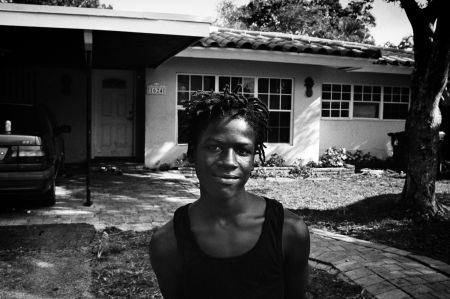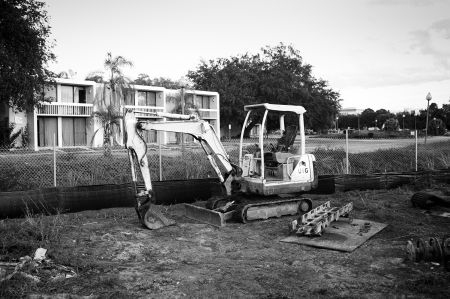BROWARD COUNTY, FLORIDA—Corporations and wealthy investors have been buying up the glut of homes repossessed by banks since the subprime mortgage crisis began in the US in 2007, netting bungalows for the price of a pickup truck and then renting them back to locals. An investigation by The Dominion shows that many of those new landlords in the hardest-hit neighbourhoods are Canadians—a pattern that's especially visible in Florida.
I started my research in Broward County, an area most famous for its metropolis, Fort Lauderdale. This winter getaway destination was hit so hard by the housing crash and recession that it reached number seven on the 2012 Forbes list of "America's Most Miserable Cities." It's also one of the most popular places in Florida for Canadian buyers, according to a survey of realtors. It seems that Canadians are turning from snowbirds to vultures in South Florida.
The Broward County Property Appraiser provided me with a list of every property with an owner whose mailing address is in Canada. There were about 20,000 properties in Broward, and the vast majority—about 70 per cent—were purchased after the housing market collapse of 2007. Plugging these addresses into a Google Map shows a scattering of properties practically everywhere from the Atlantic beachfront to the affluent suburbs near the Everglades—and the low-income minority communities sandwiched between the expressways.
Showing the map on my laptop to Jeff Weinberger, a member of Occupy Our Homes-Fort Lauderdale—a group fighting foreclosures—he suggested we visit South Middle River, a predominantly black neighbourhood where a dozen Canadian-owned bungalows were clustered within a square mile.
Weinberger called the investor activity a "double-whammy" for working-class people. "The first part of it was the depreciation of home values, and people getting foreclosed," he said. "The second whammy is investors swooping in and making profits off the misery of these people who've been foreclosed."
Above: Photos by Neal Rockwell. www.nealrockwellphoto.com
"For Rent" signs multiplied as we entered an area of South Middle River where between 20 and 40 per cent of all people live below the poverty line, according to US Census Bureau estimates. We pulled up outside a boarded-up house with an overgrown lawn. The property was surrounded by a high chain-link fence. A businessman from Markham, Ontario named Kevin Guidolin bought the place in 2012 for $30,300.
When I called up Guidolin one afternoon, he said he's among a group of investors buying multiple houses “through a company," but he wouldn't disclose the number of properties or the company's name. That house in South Middle River, he said, is "the only one I believe I have in my own name."
“What we’re doing is we’re buying them directly from the bank, and then rehabbing them and putting renters in them, and selling them," said Guidolin, who owns two pavement-maintenance firms. He said he was "excited" about the investment scheme, and that finding renters was easy, but declined to comment further.
Locate, evaluate, buy and renovate. Then collect the rent and sell high. It's the basic investment formula shared by huge corporations and small-time entrepreneurs alike. The foreclosure crisis not only yielded a glut of cheap houses, but a huge uptick in the renter population. The number of US renter households increased by 1.1 million in 2012 alone, according to a June 2013 study by Harvard's Joint Center for Housing Studies.
The homes of South Florida have come to embody the grim paradoxes of this process. Many of the simple one-story bungalows in poor neighbourhoods like South Middle River sold for upwards of $200,000 just before the market collapsed. Once foreclosure was complete, investors bought those same homes for a fraction of that price.
Take the case of Mike Iraheta, a heavy-equipment mechanic living near the Federal Highway in a Broward County subdivision called Pompano Beach. Iraheta grew up in Detroit, but jobs were scarce by 1992, so he went to South Florida to work on rebuilding houses ravaged by Hurricane Andrew.
He liked the weather and bought a house, making payments on time for six years. One day, he was fixing the hydraulic line on a concrete mixing truck when oil spilled onto the steel platform. He slipped, fell five feet and twisted his leg. His employer, a multinational building-products company, disputed his workers' compensation claim. It was three months before he could start working again, and another five before he won a lawsuit against the company and got his insurance money.
When I knocked on his door one day, he invited me into his living room, where he recalled phoning the mortgage company after his injury. "They just said, no problem, we'll work with ya!" Three months later the house was in foreclosure. "They got me on a blindside there," he said. He managed to sell the place before the foreclosure was complete, saving his credit rating. But he walked away with almost nothing—he even lost the truck he was making payments on at the time—and has been a renter ever since.
Iraheta's foreclosure experience took place back in 2000, foreshadowing the coming foreclosure crisis. Today, he rents a house that someone named Tiesha Duncan bought for $320,000 in 2006. Wells Fargo foreclosed on Duncan's mortgage in 2010. The bank then sold the house to an investor based in the Greater Toronto Area, a company called Way Sing Inc. The company, which owns eight homes in Broward, paid less than $56,000 for the house in 2010.
And yet, Iraheta told me he prefers renting. He can move whenever he wants, and the property management company deals with repairs. But like other renters I met in Florida, he also expressed wariness of banks. "It's all corporate stuff, and corporate is cold-hearted," he said. "You're just like a little ant on a hill. They're just going to knock you over."
The towers and high-tension wires of a power station loom above Sample Road, an arterial route forming a northern boundary of the Pompano Beach subdivision. Nearly 65 per cent of all homes here were owner-occupied in 2005-2007, but that figure slid to 56.5 per cent by 2010-2012, according to estimates from the US Census Bureau. That's a decline of at least 2,384 homes.
Mass evictions enforced by banks and police seem to have cultivated a sense of fear about homeownership in neighbourhoods like Pompano Beach and South Middle River. For the new class of landlords in post-crash America—including those Canadians collecting monthly rent payments—that trauma is good for business.
Above: All homes marked on this map of Broward County were purchased after 2006 by someone based in Canada. Properties in the $0-101 range were usually transferred between friendly parties.
But the investors I spoke to tended to see their activities in a positive light: they claim to be boosting South Florida's depressed economy by hiring local real estate agents and contractors, who repair the urban blight. Generally, the investors also hire a property manager who selects the tenants, collects the rent and maintains the properties.
Fred Reimer runs an advertising signage business in Mississauga. After the crash, he bought three houses in South Middle River for an average price of about $55,000. The empty houses had been looted and needed renovations, so he hired a contractor to fix them up.
"I'm providing a nice home that somebody can enjoy," said Reimer, when asked how he would respond to those who resent investors for profiting from the crash. "And I worked hard to get the money to get where I am, so I have no feelings of guilt for fixing up a dilapidated house."
There's no denying that these communities are in need of cash. And yet, this need reveals the dystopian realities of post-crash America: urban decay and unemployment. In the same way, the opportunity for profit results directly from the massive transfer of wealth away from crash-stricken communities.
The landlords who agreed to speak with me were generally small-time investors like Reimer who bought a handful of properties after the crash. Community organizers like Weinberger tend to be less concerned about these small landlords than with their larger counterparts: corporations like Blackstone, a New York-based private investment firm that has spent $7.5 billion to purchase 40,000 foreclosed and distressed homes since the crash, according to a December 2013 report by the Atlanta, Georgia chapter of Occupy Our Homes.
The largest Canadian holdings I came across in Broward County were those of Toronto businessman Andy DeFrancesco, CEO of Delavaco Properties, who told me his company planned to buy 1,500 foreclosed or distressed single-family homes in 2013. DeFrancesco declined to answer multiple interview requests after our brief phone conversation in February 2013, but he confirmed that his company by then already owned nearly 100 properties in Broward alone.
Another bubble may be looming over South Florida as demand by big investors like Delavaco and Blackstone causes real estate prices to jerk upwards and stimulates new construction, said South Florida real estate analyst Jack McCabe when I spoke to him in September 2013. He described the growth of investment in single-family homes by investors—who pay with cash—as a "paradigm shift" in the Florida housing market.
The foreclosure crisis produced the chance for investors to create large-scale house rental corporations for the first time, he said, since companies are able to buy huge numbers of single-family dwellings in close proximity. This makes the work of property management more efficient.
By September, the level of all-cash transactions had reached between 40 and 50 per cent of all sales, he said, compared to about ten per cent before the crash. Those investors include "hedge funds, corporations, and high net worth individuals, including a lot of Canadians," he said, adding that Blackstone appears to be overbidding to make the value of cheaper properties go up. "It looks like another bubble."
It's hard to know exactly how much Canadian money is going into the Florida foreclosure market. The houses belonging to Delavaco, for example, weren't included in my list of 20,000 or so Canadian-owned addresses in Broward County, since the purchases go through a Fort Lauderdale-based company.
But a July 2012 report by the US National Association of Realtors found that Canadians accounted for the largest share of foreign sales in Florida. This is no small matter, because foreign investors altogether accounted for more than $10 billion in sales in the state, almost 20 per cent of the entire residential market there between 2011 and 2012.
Canadians were more likely than buyers from Brazil or the United Kingdom to buy cheaper properties: about 28 per cent of Canadians bought homes for less than $100,000. And although most Canadians bought vacation homes, nearly 17 per cent intended to use their property uniquely as a "rental for investment." One respondent to the survey wrote that Canadians "are looking for all types of income-producing properties in Florida."
When I spoke to John Tuccillo, the chief economist of Florida Realtors, he said international investment has spiked since the crash, largely due to the easy access to credit of buyers in countries like Canada, compared to the many Americans whose credit was wiped out by foreclosure.
"They've been foreclosed on, they've been kicked out of their house, so now they have to rent until they restore their credit." He said it was too early to predict whether heightened rentership in America was just temporary. It's possible, he said, "we've moved away from home ownership on a systemic, generic basis."
A dozen or so peacocks were idling in the shade near Powerline Road one Sunday afternoon last February when I returned to South Middle River to visit that bungalow owned by Kevin Guidolin, the pavement-maintenance businessman from Markham, Ontario.
It was now being rented by a woman named Nikki, who spoke to me from behind the fence and asked to be identified only by her first name. A single mother of three children, she balked at the idea of home ownership. The prospect of homelessness seemed to be a more immediate concern.
Rent, she said, takes up a large part of her income. "Anywhere you go, where you move in, the rent is not right," said Nikki. Asked what she thought about investors buying up foreclosed houses and renting them out, she said, "It's crazy."
"They're sitting up there buying everything, but they ain't got no jobs down here," said the 33-year-old woman. "Who are we to say something? That's up to the big people, right?"
Like the hurricanes that seem to batter the Florida coast more frequently than ever these days, the economic forces that govern people's lives are out of their control. The new reality is a reinforced division between tenant and landlord, and a lot of money going north.
This report is based on research conducted by David Gordon Koch as a student in the Master of Journalism program at Carleton University. More stories drawn from his research project—entitled Waiting for the Next Hurricane—can be found on his blog, fragmentofthunder.wordpress.com.





